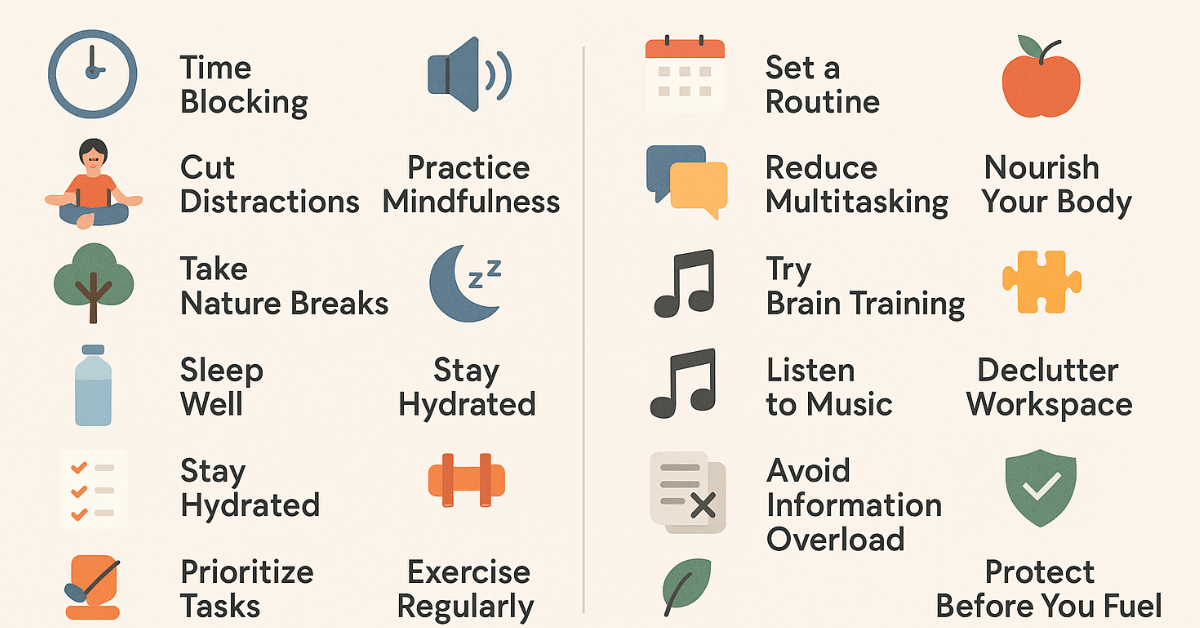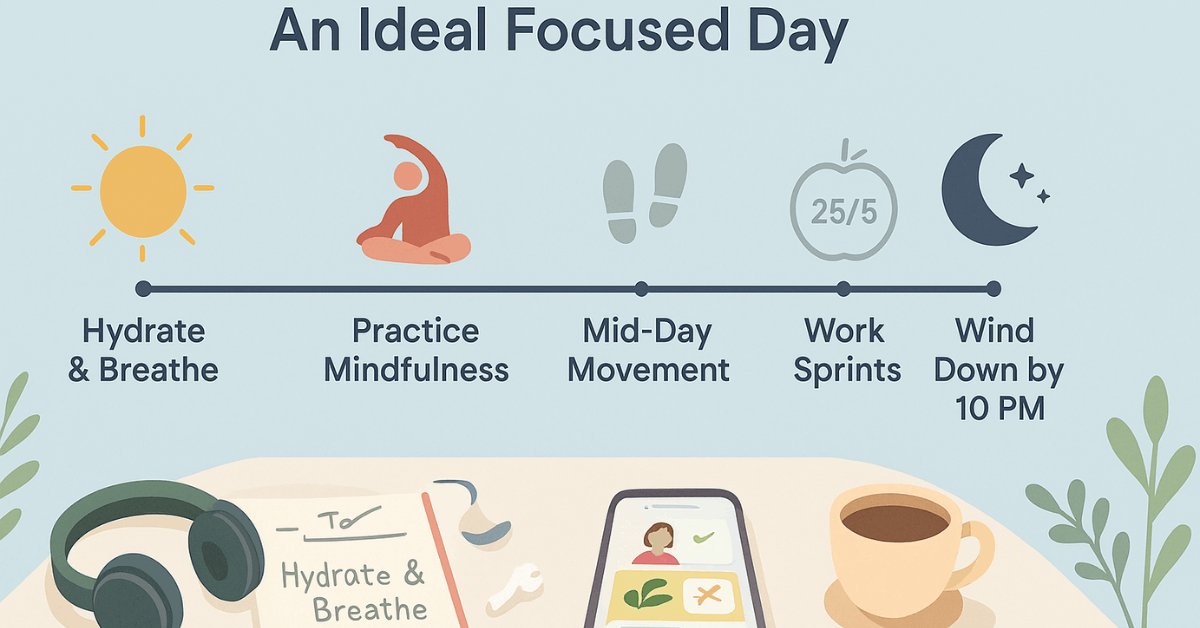Constant notifications, overflowing to-do lists, and rising expectations fueled by AI have made sustained attention a rare competitive edge worldwide.
Strengthening that edge calls for practical daily habits rather than complicated hacks. The guide below shows you exactly how to sharpen focus, deepen concentration, and produce meaningful work without feeling overwhelmed.
Focus and Concentration: Two Partners in Performance
Knowing how attention operates helps you apply the right habit at the right moment.
Focus vs. Concentration
Focus directs your mental spotlight onto chosen information while blocking background noise. Concentration keeps that spotlight steady for as long as the task demands.
How the Skills Interact
You decide to open a project file because focus filters out distractions. Concentration then maintains engagement, allowing progress until interruptions appear. Stronger skills in both areas mean fewer derailments and more flow.
Core Principles Behind Sharper Attention
Setting new habits on solid principles makes improvement faster and more reliable.
Clarity Fuels Focus
Without a clear sense of what matters, your mind will scatter its energy across competing inputs.
A well-defined objective gives your brain permission to ignore distractions and prioritize tasks that truly move the needle. Mental clarity sets the stage for meaningful progress.
Energy Sustains Endurance
Your ability to concentrate over long periods depends heavily on your physical state.
High-quality sleep, nutrient-rich meals, and regular physical movement aren’t optional — they’re the biological foundation for cognitive performance. When your body is well-supported, your mind stays sharp longer.
Environment Shapes Behavior
Your surroundings either accelerate your focus or sabotage it. Visual clutter, noise, poor lighting, or discomfort create constant friction.
On the other hand, a well-designed workspace acts like a signal to your brain: it’s time to settle in and concentrate. External order promotes internal discipline.
Emphasizing these principles across daily routines keeps every tactic in the next section effective.
15 Research-Backed Habits You Can Start Today
Adopt one habit at a time, track results, and stack additional practices once the first feels natural.
1. Eliminate Distractions by Time-Blocking
Schedule uninterrupted blocks for demanding tasks, silence notifications, and place the phone out of sight. Harvard research shows cognitive capacity rebounds when the device is physically removed.
2. Single-Task Instead of Multitasking
Handling emails while drafting reports divides attention, reduces accuracy, and drains mental stamina. Commit to one activity, finish, then move on.
3. Practice Mindfulness or Breath-Focused Meditation
Ten minutes of guided breathing trains your mind to notice wandering thoughts and gently return to the present task, strengthening the muscle of re-focus.
4. Protect Night-Time Routine
Blue-light filters, predictable bedtimes, and a cool, dark room boost melatonin production, helping your brain consolidate memory and restore focus capacity.
5. Anchor Attention in the Present Moment
Noticing immediate sensory details—keyboard texture, ambient sounds—reduces rumination and frees cognitive resources for the work directly in front of you.
6. Insert Strategic Micro-Breaks
Step away whenever concentration dips, stretch, or grab water, then resume. Short pauses reset mental endurance without destroying momentum.
7. Integrate Nature Into the Day
Desk plants or a five-minute walk among trees improve air quality, lift mood, and raise subsequent task accuracy.

8. Train Your Brain With Puzzles
Sudoku, chess, or logic apps challenge working memory and processing speed, leading to measurable gains in sustained attention.
9. Exercise for Neurochemical Balance
Moderate aerobic activity raises dopamine, norepinephrine, and serotonin, chemicals that heighten alertness and motivation during work sessions.
10. Play Background Music Selectively
Instrumental tracks or gentle nature sounds can enhance concentration, whereas lyrical music often competes for linguistic processing power.
11. Eat for Stable Energy
Favor whole grains, lean protein, nuts, and vegetables. A Mediterranean-style pattern delivers steady glucose, preventing mid-afternoon mental crashes.
12. Set a Single Priority Each Morning
Writing down the most valuable outcome for the day primes your brain to spot opportunities that support that target and ignore unrelated noise.
13. Design a Dedicated Work Zone
Clear clutter, adjust lighting, and maintain ergonomic posture. A physically ordered space signals the brain that it is time for focused output.
14. Use the Pomodoro Timer
Work for twenty-five minutes, break for five, repeat. The structured rhythm helps maintain high effort without crossing into fatigue.
15. Switch Tasks When Stuck
If progress stalls, pivot to a different assignment requiring another skill set. Fresh context keeps overall productivity high while the subconscious processes the original challenge.
When Focus Still Falters
Even disciplined individuals sometimes struggle. Check potential root causes and address them directly.
- Cognitive patterns: Overactive thought loops or memory lapses scatter attention.
- Psychological pressures: Anxiety, grief, or depression can monopolize mental bandwidth.
- Medical factors: Conditions such as ADHD, diabetes, or anemia disrupt neural efficiency.
- Environmental stressors: Excessive heat, noise, or interpersonal conflict drain concentration quickly.
- Lifestyle gaps: Dehydration, irregular meals, or chronic fatigue erode performance.
Identifying the dominant obstacle guides you toward targeted professional help or lifestyle adjustments rather than relying solely on willpower.

How to Make Your Habit Sustainable?
Daily structure turns isolated tactics into an integrated system.
Morning Foundations
Hydrate upon waking, perform a brief mindfulness exercise, and review your priority list. A calm start stabilizes mood and primes productive momentum.
SMART Micro-Planning
Break larger goals into specific, measurable tasks due today. Tracking completions reinforces dopamine-driven motivation and keeps long projects on schedule.
Sleep, Nutrition, and Movement
Aim for seven to nine hours of rest, plan fiber-rich meals, and schedule exercise comparable to a brisk thirty-minute walk. Physical upkeep safeguards cognitive clarity.
Healthy Coping Strategies
Balance intense work with hobbies, social support, or pet interaction to manage stress hormones and preserve mental agility.
Purposeful Breaks and Rewards
Insert regular pauses, then celebrate milestones with meaningful activities. Positive reinforcement strengthens habit loops, making consistency easier.
Conclusion
Improving focus and productivity is an ongoing process rather than a one-time fix.
Adopting even one habit from this list initiates a positive feedback cycle: sharper attention enables higher-quality work, which fuels satisfaction and encourages further improvement.
Stay patient, adjust strategies to fit your worldwide context, and monitor progress steadily. Consistency—not perfection—creates the lasting concentration needed to excel in a distraction-heavy world.





